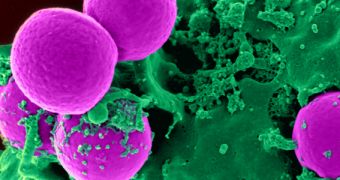British scientists at the University of Nottingham announce the development of a new type of artificial material, which relies on simple synthetic polymers that are capable of destroying the communication pathways that microorganisms such as bacteria construct between themselves.
These results may soon be used to develop advanced therapies against a number of conditions triggered by resilient bacteria. Some of these dangerous organisms include Methicillin-resistant Staphylococcus aureus (MRSA), Pseudomonas aeruginosa, and Escheria coli.
By disrupting communications between individual bacteria in the same biofilm or community, doctors will be able to prevent the microorganisms from sharing tips and tricks on how to become resilient to new generations of antibiotics.
In addition, the new discovery may be put to good use in synthetic biology, where scientists are using bacteria and other microorganisms to produce a wide array of essential chemicals. Details of the study were published in a recent issue of the top scientific journal Nature Chemistry, AlphaGalileo reports.

 14 DAY TRIAL //
14 DAY TRIAL //